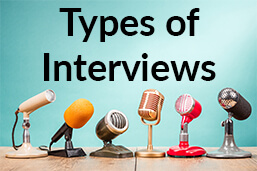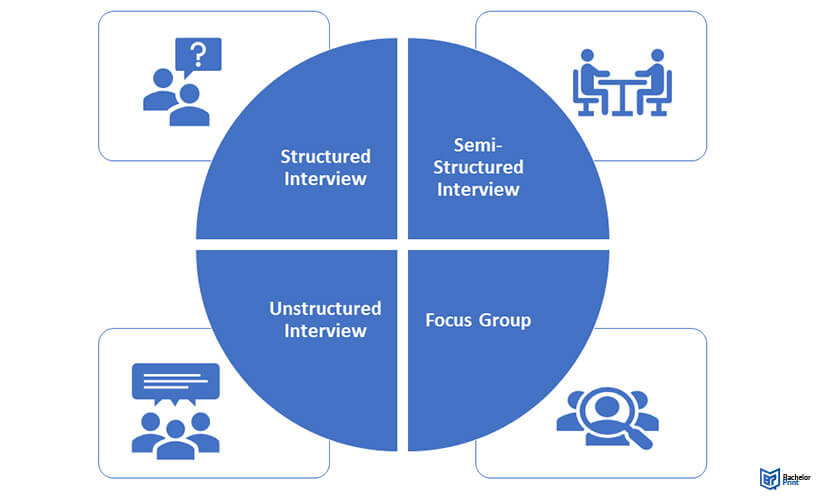
The methodology of employing different types of interviews plays a pivotal role in research, allowing for deep, qualitative insight into subjects’ experiences and perspectives. From structured to semi-structured and unstructured interviews, each type provides unique and invaluable information to meet diverse research objectives. In this guide, we will learn about the different types of interviews and where they are best applied.
Definition: Types of interviews
There are three types of interviews, and these differ in the structure of the questions. The types of interviews are structured interviews, semi-structured interviews, and unstructured interviews. Structured interviews involve the use of set questions, and these must be asked in a given order. On the other hand, unstructured interviews are flexible and feature open-ended questions. Semi-structured interviews have elements of both structured and unstructured interviews.

Types of interviews – Structured interview
A structured interview is one where the questions are predetermined and set in a particular order. Typically, the questions will be closed-ended and will offer multiple choices. Since the questions are asked in a set order, it is easy for the researcher to compare responses and determine the patterns. Structured interviews help to mitigate biases and offer higher levels of validity and reliability. You can use this type of interview in the following cases:
- You understand the subject thoroughly and can design excellent questions
- You don’t have sufficient time and resources to carry out the research
- Your research question depends on a strong parity between the respondents
Types of interviews – Semi-structured interview
Semi-structured interviews have elements of both structured and unstructured interviews. With these interviews, the researcher will have an idea of the questions to ask, but the phrasing and order of the questions will not be set. Since they are often open-ended, the researcher will enjoy high levels of flexibility, and they will still be able to compare the responses fairly easily. These types of interviews are ideal in these situations:
- The researcher has a lot of experience in interviews
- The research question is exploratory in nature
Types of interviews – Unstructured interview
Unstructured interviews are also known as non-directive interviewing, and they don’t have a set pattern. Also, questions are not arranged in advance. These interviews are used as exploratory research tools and are commonly used in social sciences and humanities. Here are some occasions when an unstructured interview will be a great fit:
- If the research question is exploratory in nature
- If the research requires you to form a connection with your respondents
Types of interviews – Focus group
With focus group interviews, the researcher will present the questions to a group instead of an individual. These types of interviews don’t just study the responses of the interviewees; they also study the group dynamic and body language. The main issue with focus group interviews is that they have low external validity, and the interviewer may be biased when choosing the responses to include. Here are a few cases where focus group interviews can be suitable:
- If the study depends on group discussion dynamics
- If the questions are complex and can’t be answered with multiple choices
- If the study is open to uncovering new ideas and questions
Types of interviews – Examples of interview questions
The types of interview questions will vary depending on the type of interview. With structured interviews, the questions are set and precise, but the other types of interviews allow for flexible and open-ended questions.
| Type of interview | Example questions |
|
Structured interviews |
• Do you own a car? Yes/No • Which is your favourite beverage? Coffee, tea, or chocolate |
| Unstructured interviews | • How do you feel about pets? • Why do you think you have those feelings regarding pets? |
| Semi-structured interviews | • Do you like sports cars? Yes/No • If yes, what do you like about these vehicles? • If no, what do you have about these vehicles? |
| Focus group interviews | • If you could change one thing about our products, what would it be? |
Pros and Cons of different types of interviews
Interviews can help you collect useful information, but the types of interviews come with different pros and cons.
| Type of interview | Advantages ✔ | Disadvantages ✘ |
|
Structured interviews |
• Less susceptible to interviewer bias • Offer very high levels of credibility and validity • Simple to use Won’t cost a lot of money or time |
• Can make the interviewees uncomfortable • Are not flexible • Have limited scope since they are closed-ended |
| Unstructured interviews | • Highly flexible • Respondents are more open as it is structured like a daily conversation • Have a lower risk of bias • Offer more details and nuance |
• Can be hard to generalize the results of these interviews • Can be hard for the interviewer to keep their opinions or feelings in check • Consumes a lot of time • Pose a risk of low internal validity • The interviewer may be tempted to ask leading questions, and this increases bias |
| Semi-structured interview | • Limits distraction during the interview • Combines the benefits of structured and unstructured interviews • Offers high levels of detail |
• The flexibility of these interviews can reduce the validity of the study • They have a high risk of bias • It is hard to come up with good questions for these types of interviews |
| Focus group | • Is highly efficient • Interviewees will be more open • Can be done on a low budget • Makes it easy to discuss a variety of topics |
• Interviewer won’t be able to ask too many questions • Requires excellent leadership and social skills • It has a risk of social desirability bias • Interviewer cannot guarantee confidentiality |
FAQs
This is a type of bias that emerges when the characteristics of an interviewer affect the responses given by the respondents.
Unstructured interviews are great for building a bond with the respondent, and they can be used in cases where the interviewer needs the interviewee to be 100% honest.
Structured interviews will be a good option for your research if you have limited time and resources. This is because they are easy to analyse.
The three types of interviews in research are structured interviews, semi-structured interviews, and unstructured interviews.
